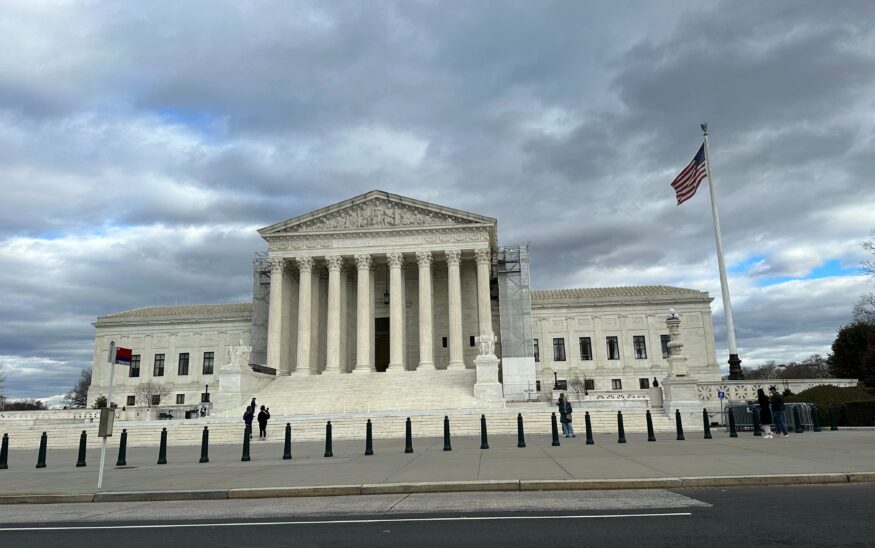Marquette Poll: U.S. Supreme Court approval falls to 39%
By: WISCONSIN LAW JOURNAL STAFF//May 23, 2024//
Marquette Poll: U.S. Supreme Court approval falls to 39%
By: WISCONSIN LAW JOURNAL STAFF//May 23, 2024//
A new Marquette Law School Poll national survey finds that 39% of adults approve of the job the U.S. Supreme Court is doing, while 61% disapprove. This is the lowest approval of the Court since July 2022, when 38% approved and 61% disapproved. Approval has fluctuated in the low to mid 40% range since March 2023, with the exception of March 2024 when approval was at 47%, according to Marquette.
Approval of the Court fell from 66% in September 2020 and 60% in July 2021 to the mid-50% range later in 2021 and early 2022. It fell again, to 38%, in July 2022 following the Dobbs v. Jackson Women’s Health Organization decision overturning the 1973 Roe v. Wade decision that had made abortion legal nationwide. Since then, until this month’s survey, approval has fluctuated between 40% and 47%.
The latest Marquette Law School Poll national Supreme Court survey was conducted May 6-15, 2024. The survey interviewed 1,033 adults nationwide and has a margin of error of +/-4.3 percentage points.
Approval of the Court fell in May across all categories of partisanship, declining 7 percentage points among Republicans, 12 points among independents, and 8 points among Democrats. Approval by party over the last three polls.
Cases before the Court
One case pending before the Court is Trump v. United States, concerning presidential immunity from criminal prosecution. The case was argued on April 25, according to Marquette.
To understand how former President Donald Trump’s involvement affects views of presidential immunity, the poll asked a random half of the sample if “former presidents” should have immunity and the other half if “former President Donald Trump” should have immunity. Of those thus asked, 16% said “former presidents” should have immunity, while 71% said they should not. Of those asked about “former President Donald Trump,” 30% said he should have immunity, while 60% said he should not. The effect of mentioning Trump almost doubles support for immunity—increasing it by 14 percentage points, a larger effect than the 8-percentage-point effect found in March before the case was argued.
Legal News
- WisGOP successfully hosts Southeast Regional Headquarters grand opening
- Milwaukee woman wanted in murder-for-hire plot in the U.K.
- New York City man sent to prison for defrauding Wisconsin residents in Brewers and Bucks ticket scam
- Whole Foods shooting draws large police presence
- Wisconsin sheds light on World Elder Abuse Awareness Day
- WisGOP to host grand opening of Waukesha regional HQ office
- A 9-year-old boy is fatally shot in Milwaukee, the city’s 4th young gunshot victim in recent weeks
- Milwaukee Bar Association honors legal community, introduces Board at annual meeting
- Wisconsin Supreme Court rules against use of mobile voting vans
- Supreme Court preserves access to abortion drug mifepristone
- Milwaukee Police launch Operation Summer Guardian ’24
- Wisconsin lawmaker receives ‘scales of justice’ award from State Bar
Case Digests
- Protective Placement Order
- DOJ Denial of Handgun Purchase
- Excusable Neglect- Erroneous Exercise of Discretion
- Sentencing Guidelines- Impersonation of a Law Enforcement Officer
- Sentencing Enhancements
- Suppression of Evidence-Unlawful Search
- Insurance-Arbitration Award Enforcement
- Ineffective Assistance of Counsel- Deficient Performance and Prejudice
- Bankruptcy-Insolvency Assessment
- Immigration- I-360 petition-Due Process
- Social Security Disability Benefits-Burden of Proof
- Lease Dispute-Timeliness












